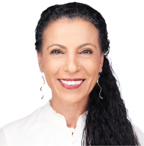Recognizing the contributions of Highly Cited Researchers towards the SDGs
We’re pleased to celebrate scientists leading the way in sustainability research, including in the areas of health, wellbeing, education, peace and justice, gender equality and clean water. Spotlights are not meant to be comprehensive lists of all Highly Cited Researchers contributing to a given SDG; there are many other Highly Cited Researchers that have contributed to the SDGs, not named here.
Follow the Clarivate blog for Highly Cited Researchers insights year-round
“What I wanted people to take away from this study is that we can feed the world using more sustainable forms of agriculture, but only if we change the balance of food we eat, for example, by radically reducing meat and dairy consumption in over-consuming countries. Ever greater levels of agrochemical inputs into agriculture is not a given, if we reimagine what food we eat and how we produce it.”
“The recent global assessments of cancers attributable to infection, obesity, and ultraviolet radiation remind us of the sheer variability in their importance for different parts of the world and the need to tailor cancer control actions in accordance with localized patterns of risk factors and cancer burden profiles.”
Dr. Freddie Bray
World Health Organization
Highly Cited Researcher 2022
“Women and families have a right to positive pregnancy, childbirth and postnatal experiences, supported by empowered health workers, majority of whom are women. […] Our research showed that mistreatment during childbirth occurs across low-, middle- and high-income countries and good quality of care needs to be respectful as well as safe, no matter where you are in the world.”
“In our nationally representative, quasi-experimental study, police killings of unarmed black Americans had adverse effects on the mental health of black Americans in the general population. These findings bolster calls to more accurately measure police killings and provide an additional public health rationale to better understand and address the potential pathogenic effects of police killings of unarmed black Americans and other manifestations of structural racism in the USA.”
David Williams
Harvard University, United States
Highly Cited Researcher 2022
“Increasingly, water quality is doubly endangered by scarcity and pollution, which, like a boomerang, impacts human health and wellbeing. Ironically, this is a consequence of the human ‘progress’, which urgently needs to be reassessed. The positive point is that we can all play a role in this change!”


